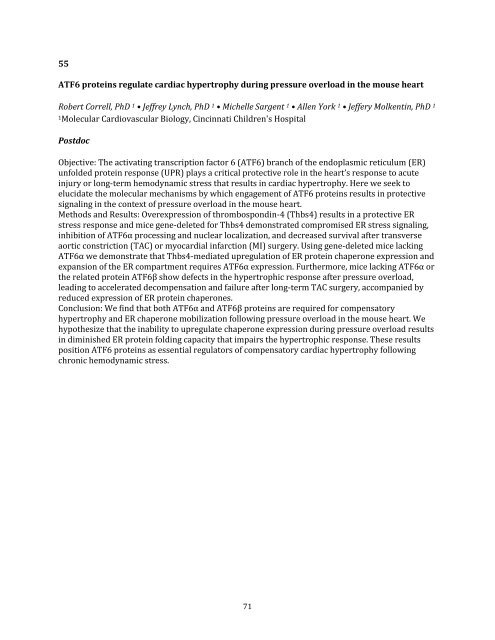2017 Cardiovascular Research Day Abstract Book
You also want an ePaper? Increase the reach of your titles
YUMPU automatically turns print PDFs into web optimized ePapers that Google loves.
55<br />
ATF6 proteins regulate cardiac hypertrophy during pressure overload in the mouse heart<br />
Robert Correll, PhD 1 • Jeffrey Lynch, PhD 1 • Michelle Sargent 1 • Allen York 1 • Jeffery Molkentin, PhD 1<br />
1Molecular <strong>Cardiovascular</strong> Biology, Cincinnati Children's Hospital<br />
Postdoc<br />
Objective: The activating transcription factor 6 (ATF6) branch of the endoplasmic reticulum (ER)<br />
unfolded protein response (UPR) plays a critical protective role in the heart’s response to acute<br />
injury or long-term hemodynamic stress that results in cardiac hypertrophy. Here we seek to<br />
elucidate the molecular mechanisms by which engagement of ATF6 proteins results in protective<br />
signaling in the context of pressure overload in the mouse heart.<br />
Methods and Results: Overexpression of thrombospondin-4 (Thbs4) results in a protective ER<br />
stress response and mice gene-deleted for Thbs4 demonstrated compromised ER stress signaling,<br />
inhibition of ATF6α processing and nuclear localization, and decreased survival after transverse<br />
aortic constriction (TAC) or myocardial infarction (MI) surgery. Using gene-deleted mice lacking<br />
ATF6α we demonstrate that Thbs4-mediated upregulation of ER protein chaperone expression and<br />
expansion of the ER compartment requires ATF6α expression. Furthermore, mice lacking ATF6α or<br />
the related protein ATF6β show defects in the hypertrophic response after pressure overload,<br />
leading to accelerated decompensation and failure after long-term TAC surgery, accompanied by<br />
reduced expression of ER protein chaperones.<br />
Conclusion: We find that both ATF6α and ATF6β proteins are required for compensatory<br />
hypertrophy and ER chaperone mobilization following pressure overload in the mouse heart. We<br />
hypothesize that the inability to upregulate chaperone expression during pressure overload results<br />
in diminished ER protein folding capacity that impairs the hypertrophic response. These results<br />
position ATF6 proteins as essential regulators of compensatory cardiac hypertrophy following<br />
chronic hemodynamic stress.<br />
71


